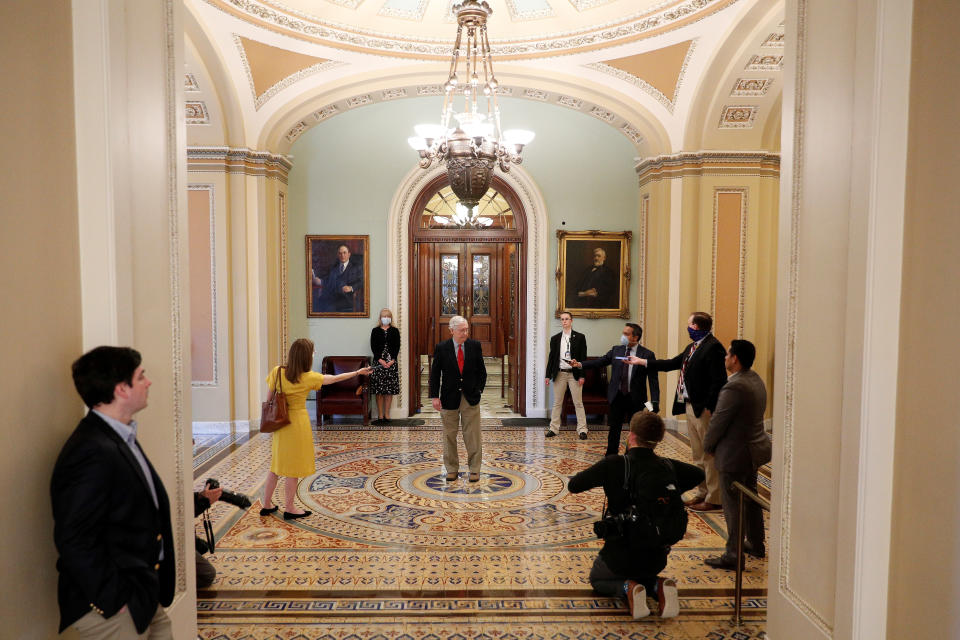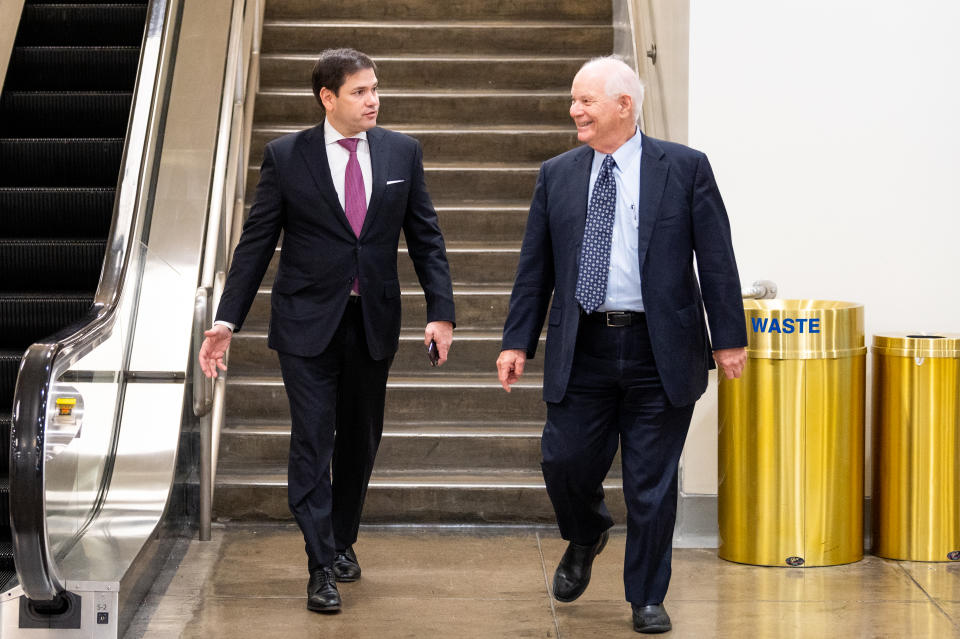Senators say leaders from both parties are stopping renewal of small business relief for coronavirus
WASHINGTON — The Democratic senator who helped design the small business emergency fund that ran out of money Thursday said that if Senate Majority Leader Mitch McConnell would allow bipartisan negotiations over securing more funding, a deal could be worked out in an hour or so.
“These issues are not difficult to resolve, but there needs to be a bipartisan process,” Sen. Ben Cardin, D-Md., told Yahoo News in an interview.
Cardin’s key counterpart among Senate Republicans, Sen. Marco Rubio, R-Fla., shares Cardin’s priorities for the loan program but feels Democratic leaders are slowing progress toward a deal by insisting on adding in money for hospitals and state governments.
McConnell has pushed for a week to authorize an additional $250 billion for the Paycheck Protection Program (PPP), which is designed to help businesses keep workers on their payrolls during the coronavirus pandemic.

And on Thursday, McConnell said it was “surreal” to see Democrats oppose his initiative as the first $349 billion allocated for the PPP was reported to be already used up. “Americans need Democrats to stop blocking emergency paycheck money and let this job-saving program reopen,” he said in a brief floor speech.
But Cardin said there are small businesses that have not been able to access funds through PPP that will go out of business permanently if changes are not made to the program now.
“When you take a look at who got this $349 billion, I am very confident you’re going to find underrepresentation in those communities where small businesses did not have a bank willing to write a loan, and we’ve got to correct that.
“If we don’t — if we just do what the Republican leader came in with — we’re going to find out that in two weeks a lot of these small businesses are closed and will never reopen again,” Cardin said on “The Long Game,” a Yahoo News podcast.
Cardin said he wants to ensure that some portion of the next installment of funds goes toward community banks that will lend to smaller businesses in less prosperous parts of the country and to minority-owned companies.
“I think we’ve got to do more than what they’re saying, immediately, or small businesses are going to close,” Cardin said.

McConnell has said that any proposal right now has to be narrow in scope because it must pass unanimously through both the Senate and the House. Congress is not meeting in person, and so any measure can be blocked by just one member of either chamber.
But Cardin was adamant that he could reach a deal easily that would attract bipartisan support. He worked with Rubio to create the PPP, which has helped small businesses avoid going under.
A Rubio aide, meanwhile, told Yahoo News that the Florida Republican shares Cardin’s goal of expanding the reach of the emergency loan programs to underserved communities, but that demands from Senate Minority Leader Chuck Schumer, D-N.Y., and House Speaker Nancy Pelosi, D-Calif., that go beyond the loan programs are bogging down the process.
The PPP lends up to $10 million to businesses with 500 employees or fewer, with funds backstopped by the U.S. government, and the business does not have to repay the loan if it uses at least 75 percent of the money to retain employees.
Cardin and Rubio partnered with Sen. Susan Collins, R-Maine, and Sen. Jeanne Shaheen, D-N.H., on the PPP, which Congress funded to the tune of $350 billion in late March. That group of bipartisan senators also worked to secure $10 billion for another program aimed at helping small businesses survive the economic shutdown during the coronavirus crisis: Economic Injury Disaster Loans (EIDL).
“We’re deeply committed to making sure money’s available. We’re prepared to do that today. Sit and talk with us,” Cardin said. “I told my staff that I think it would take us less than one hour for Senator Rubio, Senator Collins, Senator Shaheen and myself to reach an agreement. Less than an hour.”
Democrats have also said they want to include more funding for state governments and hospitals in this current measure.

President Trump’s reelection campaign has seen political advantage in the standoff, hammering Democrats for not agreeing to McConnell’s clean funding increase. “Democrats are shamelessly playing politics and putting Americans into greater economic danger,” said Tim Murtaugh, a spokesman for the president’s reelection campaign, in a press release.
But Cardin said McConnell, by not including Democrats in crafting the current proposal, was the one being partisan, adding, “the American people are sick and tired of playing partisan politics during a national crisis like this pandemic.”
Cardin also stressed that it’s not just PPP that needs more money urgently to save small business. The EIDL program does not require businesses or business owners to have existing relationships with banks to access funding, like the PPP does. The loans and grants through EIDL come directly from the Small Business Administration.
“That money ran out before the PPP money ran out,” Cardin said. “[The EIDL] helps the more vulnerable small businesses. … Why didn’t the Republican leadership think about them when they asked for the more money? So that’s why you have communications back and forth. That’s how you get a bipartisan product.”
Cardin also said he has been working on trying to understand why the nation’s ability to ramp up its COVID-19 testing capabilities is still lagging behind where it needs to be. He recommended that the president further utilize his powers under the Defense Production Act to direct American companies to manufacture more of the chemicals needed to produce results.
The lack of swabs and kits that are also contributing to the delay in increasing testing can be sourced domestically without a nudge from the U.S. government, Cardin said.
It’s clear that a dramatic increase in testing capacity is vital to getting the economy and the nation out of quarantine, as well as the ability to trace the contacts of those who do test positive.
“The more testing, the more open the economy. But there’s not enough national capacity to do this,” New York Gov. Andrew Cuomo, a Democrat, said Wednesday. “We can’t do it yet. That is the unvarnished truth.”

The U.S. is currently conducting around 150,000 tests a day, but that number needs to go up exponentially: Estimates range from a bare minimum of 500,000 a day to 22 million.
Cardin lamented the lack of clarity and focus from the Trump administration to date.
“We’ve never seen the federal government use all the power it has, including the Defense Production Act, to say we’re going to have this amount of capacity in this country,” he said. “We never had that matrix given to us, and therefore we have always been behind the curve.”
“To this date we don’t have a realistic game plan to fill the needs for testing,” he said
_____
Click here for the latest coronavirus news and updates. According to experts, people over 60 and those who are immunocompromised continue to be the most at risk. If you have questions, please refer to the CDC’s and WHO’s resource guides.
Read more from Yahoo News:


